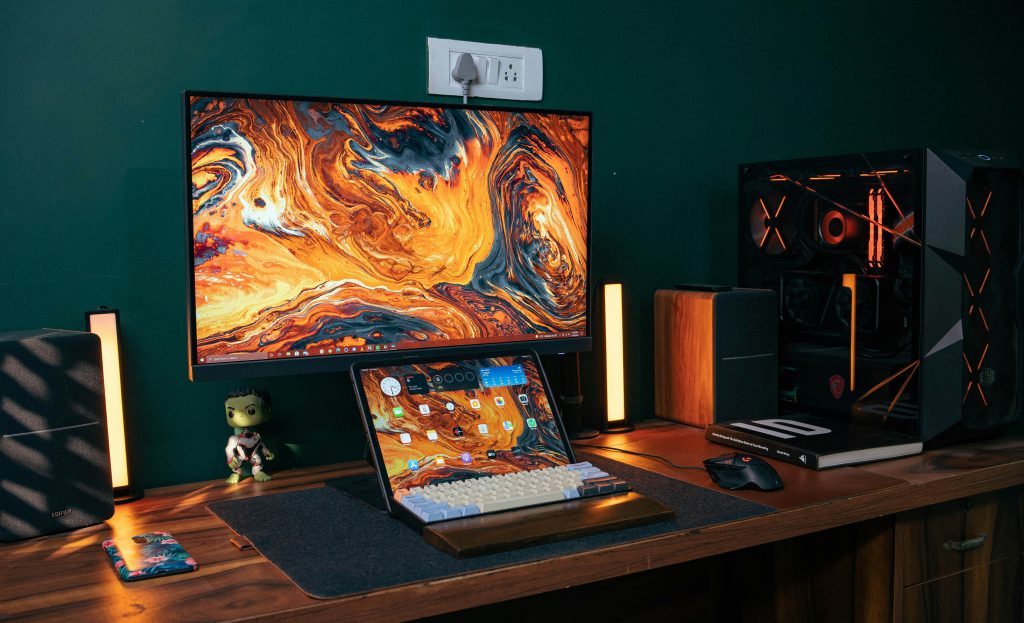When it comes to gaming, one of the biggest decisions every gamer faces is whether to go for a gaming laptop or a desktop PC. Both options offer distinct advantages, but they also come with their own set of challenges. Whether you’re a casual gamer looking for portability or a hardcore enthusiast in search of maximum performance, your choice between a gaming laptop and a gaming PC can dramatically impact your overall experience.
In this blog, we’ll break down the pros and cons of gaming laptops and gaming PCs to help you make an informed decision based on your needs and preferences.
1. Portability vs. Power: What’s Most Important?
Gaming Laptops:
- Pros: One of the most significant advantages of a gaming laptop is its portability. These machines are designed to be compact, allowing you to game anywhere – whether it’s in a café, at a friend’s house, or even while traveling. Modern gaming laptops are lightweight and slim, making it easy to slip them into a bag and go. Most gaming laptops also feature long-lasting batteries, so you can game for hours without being plugged into an outlet.
- Cons: While gaming laptops have improved significantly in terms of performance, they can’t quite match the raw power of a desktop PC. High-end gaming laptops tend to be more expensive for similar performance, as manufacturers have to pack a lot of power into a small, portable form factor.
Gaming PCs:
- Pros: Desktop gaming PCs, on the other hand, are where you’ll find the highest performance, especially when it comes to graphics, processing power, and storage. You can customize a PC to meet your exact specifications, allowing for superior cooling systems, powerful GPUs (graphics cards), and ample room for upgrades. If you’re planning on running games at ultra settings or using VR, a PC is the way to go. PCs are also less likely to overheat, as they have better ventilation and larger cases.
- Cons: The major downside of gaming PCs is that they aren’t portable. They are bulky and heavy, so they’re not ideal for gamers on the go. Setting up a gaming PC also requires more space and effort, from setting up peripherals (monitor, keyboard, mouse, etc.) to organizing cables.
2. Performance: Power and Customization
Gaming Laptops:
- Pros: Gaming laptops are often equipped with powerful components such as high-end GPUs and processors, making them capable of handling the latest AAA titles with decent frame rates and graphics settings. Many of today’s gaming laptops feature 144Hz or 240Hz displays, ensuring smooth and gameplay.
- Cons: Despite their impressive specs, gaming laptops tend to face thermal throttling when put under heavy load, which can reduce performance over time. This is due to their smaller form factor, which limits cooling capacity. While you can get decent performance, you may not be able to achieve the same level of power as a gaming PC.
Gaming PCs:
- Pros: PCs reign supreme when it comes to performance. They offer the ability to upgrade components such as your GPU, CPU, RAM, and storage to ensure you’re always running the latest and most demanding games at optimal settings. High-end desktops can support multiple GPUs (SLI or Crossfire), increasing graphical performance and enabling features like 4K gaming or VR.
- Cons: While desktops offer unparalleled performance, it’s important to note that gaming PCs can be quite expensive, especially when you’re going for the latest and greatest components. Additionally, gaming PCs tend to consume more electricity and may require regular maintenance to keep everything running smoothly.
3. Upgradability and Longevity
Gaming Laptops:
- Pros: Laptops are more portable and tend to have longer battery life, but they lack the upgradability of a PC. However, certain models allow for upgrades to memory (RAM) or storage (SSD/HDD), which can help extend the lifespan of the device.
- Cons: The upgradability of gaming laptops is generally limited compared to PCs. The GPU, CPU, and cooling systems are often fixed, meaning that once these components start to age, your laptop will likely require a complete replacement.
Gaming PCs:
- Pros: One of the biggest benefits of owning a gaming PC is its upgradability. You can swap out individual components like the GPU, RAM, processor, or even the motherboard. This means your PC can remain relevant for many years, as you can upgrade parts as technology advances without needing to buy an entirely new system.
- Cons: While upgradability is a huge plus, it can also be a downside for those who don’t want to deal with the hassle of researching and purchasing parts. A DIY build or even custom pre-built systems can sometimes be complicated, requiring technical knowledge.
4. Price: Which Is More Cost-Effective?
Gaming Laptops:
- Pros: In terms of initial cost, gaming laptops can often seem more affordable than custom-built gaming PCs, especially if you’re looking for an all-in-one solution. You pay for portability and convenience, and for the most part, gaming laptops have all the components you need to get started immediately.
- Cons: However, gaming laptops tend to offer less value for money compared to a desktop, especially in the high-end segment. For the same price, a gaming laptop may not perform as well as a desktop PC, as manufacturers have to balance power, portability, and battery life.
Gaming PCs:
- Pros: In terms of performance per dollar, gaming PCs are often a better value. You can build a high-performance gaming PC for the same price as a mid-range gaming laptop, and you’ll get better performance in most cases. Plus, you’ll have the flexibility to upgrade components as needed.
- Cons: The initial cost of a gaming PC can be higher due to the need for additional peripherals, such as a monitor, keyboard, mouse, and speakers. You’ll also need a dedicated space for the system, making it less convenient than a laptop for those with limited space.

